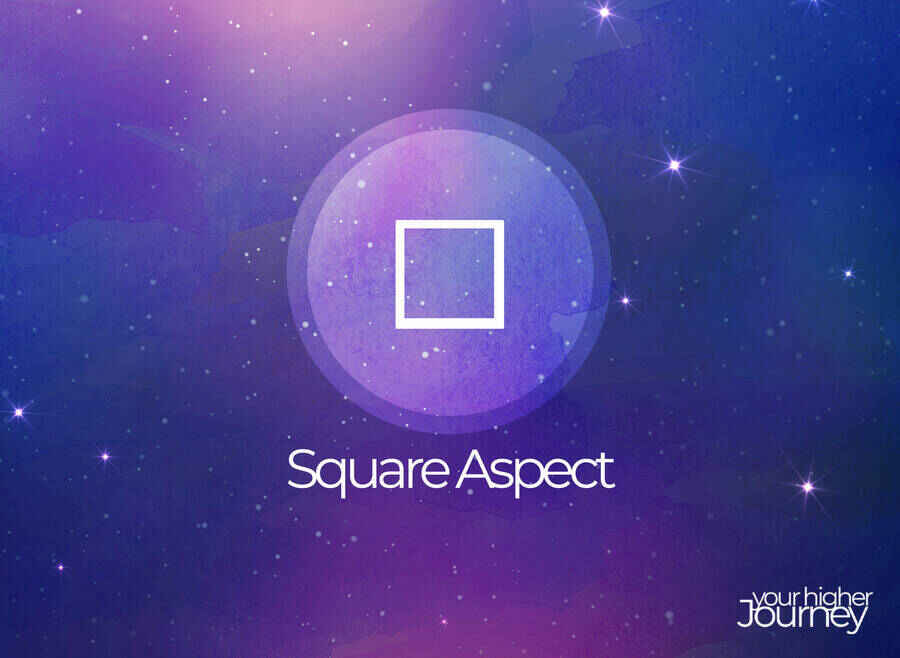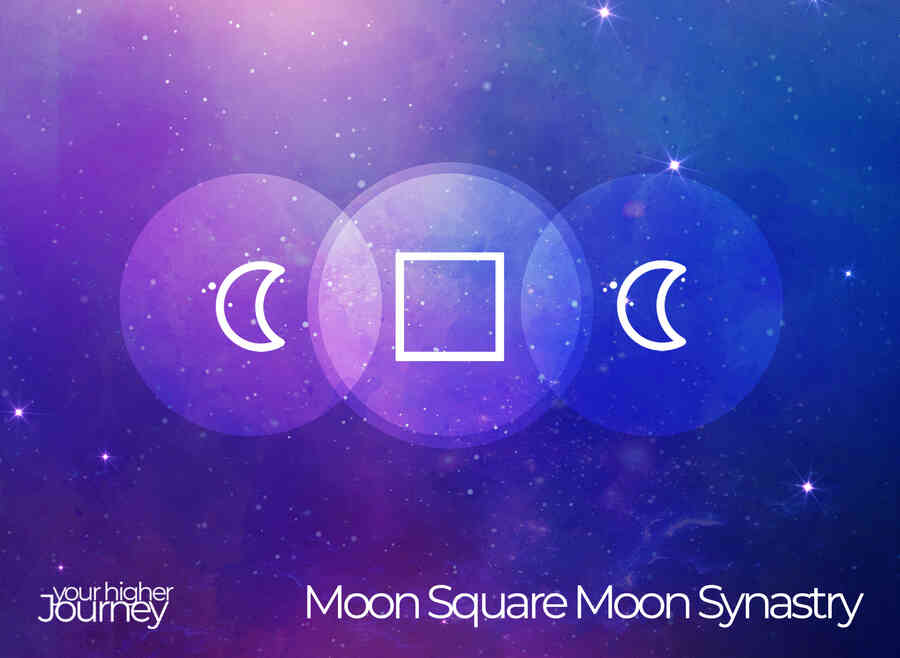Moon Square Moon Synastry indicates a problematic relationship with cumbersome obstacles to face. There will be considerable amounts of disagreements, conflict, and deep-rooted differences that are difficult even to identify.
Still, a Moon Square Moon Synastry is not a death sentence for the relationship. It just means that both individuals will have to be willing to put in the work to better understand and accommodate the other.
The Moon In Astrology

The Moon signifies that both people in the relationship will naturally, and frequently, irritate one another.
This is because the Moon controls the subconscious and habitual aspects of people and their relationships with others. Most of these subconscious actions and daily habits or schedules pertain to routines, errands, chores, meals, mealtimes, work, play, and daily care tasks.
For instance, one person may be an early bird, while the other is more of a night owl.
One person may tidy as they go, while the other likes to save all of their cleaning for one big occasion.
One may be an introvert, while the other is a bonafide extrovert.
While each of these differences feels insignificant alone, together, they can be irritating or at least bothersome to accommodate, especially when cohabitating.
The Meaning Of Squares In Astrology

Astrology Aspects are used to define the relationships between planets. These relationships can be helpful or hurtful, peaceful or in turmoil.
Squares indicate tension, conflict, or irritability between two planets at the same mode and 90 degrees from one another. The Square is the most difficult aspect of the Zodiac, but it is also associated with the potential to grow, change, and create conflict resolution. Squares are best thought of as meaningful opportunities, rather than challenges.
How Moon Square Moon Relationships Promote Growth
These small idiosyncrasies will require both people in the relationship to identify their triggers, communicate with one another in a healthy way, make some compromises, sacrifice a little, and learn to tolerate some of these differences in a way that is bearable and sustainable.
Most of the differences between individuals who have a Moon Square Moon Synastry are not revealed until many months (or years) into the relationship. It’s most common for this issue to arise shortly after a couple moves in together, which makes the conflict feel high stakes and nerve-wracking.
If the couple doesn’t immediately have a blow-up and split up, they will certainly be embarking on a journey of self-reflection, communication, compromise, and tolerance.
Common Struggles Of Moon Square Moon Synastry Relationships

It is important to note that friendships with a Moon Square Moon Synastry tend to fare better than romantic relationships.
This is because the former relationship allows each individual time away from each other, and a certain level of “professionalism” or at least a little distance between them. These relationships require fewer joint decisions, and the space between them provides a necessary buffer zone. The friction that does happen is usually not filled with as many emotions, which is largely helpful.
Romantic relationships tend to mean that both people will have to agree on many fundamental issues, get along for many hours a day, and even cohabitate in a tight, shared space. Disagreements here feel exceptionally personal, intense, and emotionally charged.
Roommate and business-style relationships are more difficult than friendship-style Moon Square Moon Synastry relationships but still easier than romantic ones.
The first issue with the relationship is that it will be difficult to pin down exactly what one person finds upsetting or annoying about the other. Without knowing, it’s impossible to begin the process of understanding and correcting. Nitpicky issues are not usually an issue if there are only a few. In a Moon Square Moon Synastry though, there are many of them, and they are almost painful to live with.
1 Conflicting Schedules
It is easy for one (or both) partners to feel avoided or even abandoned because the other person lives on a different schedule.
It’s common for both people to have careers and hobbies that don’t include each other. It is less common, and much more difficult, for both people to have different routines that don’t allow them to see each other often or for very long.
In roommate relationships, this may be beneficial. In romantic relationships, it’s a tough obstacle to work through.
2 Different Habits
One person may believe that beds should be made immediately after waking. The other may find the process of making the bed time-consuming and pointless.
One may see sweeping as a daily chore; the other sees it as a weekly chore.
One wants to run the dishwasher after every meal; the other prefers to have a full load of dishes before running the machine.
One dresses up every day, and feels that a tidy appearance is necessary and moral. The other prioritizes comfort and believes that dressing up should not be a required or integral part of venturing into the public.
It is also common to see one person who wants to have several pets indoors, while the other believes that animals belong outside, or the number of them allowed into the home should be limited to one or two creatures.
Another prominent argument involves downtime. Usually, one person wants to be active, go outside, get creative, hit the town, work on a side hustle, or exercise. The other person usually feels compelled to stay inside, read a book, binge a TV series, or play a game.
At some point, these small issues go from menial and small to significant and quite insulting. The line drawn in the sand is invisible, which is why it’s easy to cross, and also difficult to find and make more apparent as a couple.
Not folding the laundry immediately after it dries is just a difference of opinion. Not spending quality time together, ignoring your partner’s needs, or favoring your own relaxation style over theirs (or completely ignoring their wants and needs altogether) feels deeply personal and hurtful.
Helpful Advice For A Moon Square Moon Synastry Relationship

1 Determine What Bothers You
You can’t correct what you can’t identify, so take the time to figure out exactly what irks you. Make a list, and pinpoint precisely what it is about this behavior or habit that upsets you.
2 Discuss Your Issues With Your Partner
When you go to discuss the list with your partner, share these items in a polite and non-confrontational way. They aren’t wrong, and neither are you; you’re just different. It’s important to remember that the goal is to work through these issues together. Your differences are the issue, not you or your partner.
3 Reflect on Your Actions
It’s easier to pick out what your partner does that irritates you. It’s not as simple to be self-aware enough to see what you do that bugs your person.
When your partner tells you about your quirks and habits that bother them, listen, and try to see things from their perspective. Please do your best not to take their words as an attack or criticism but rather as an observation. This is an opportunity to become more self-aware and grow as a person, so use it wisely.
4 Compromise
This is an exercise in love, compromise, and selflessness. Figure out which issues are the most unsettling or challenging to live with, and start to negotiate with your lover over these differences.
It’s also wise for you to keep an open eye and stick tightly to your core values. You shouldn’t change who you are at your core to accommodate the other person, but you should be willing to make some changes in your day-to-day life.
For instance, let’s say you enjoy your three indoor kitties while your partner feels that three cats leave too much hair all over your place. On the other hand, you enjoy keeping a clean kitchen sink, while your partner tends to let dishes accumulate for two or three days before washing them.
A healthy compromise would be for you to vacuum or sweep pet hair for just fifteen minutes a day while your partner commits to washing all of the dishes every evening.
An unhealthy compromise would be for your partner to ask you to rehome your cats or for you to ask your partner to donate their gaming console.
5 Learn to Tolerate Your Differences
It’s not possible or healthy for both of you to expect one another to make complete changes to accommodate each other’s wants 100% of the time. You will have to learn how to make do with some inconveniences, and that’s okay.
For instance, your partner may want to stay up later than you to talk on the phone or watch TV while you sleep. They could turn the TV volume down to deal with your sleep needs, or you could turn on some white noise, such as a fan, to drown out their phone call.
Having a few inconvenient idiosyncrasies does not mean that you are incompatible or doomed. It just means you’ll have to tolerate a little more to be with the person you love.
Final Thoughts
Whether you and your partner can make it work or you end up separating after unveiling your Moon Square Moon conflicts, you will learn a lot about yourself as a person.
You can become more patient and empathetic to make the relationship work, or at least take your lessons from your newly acquired self-reflection, boundaries, and desires into your search for a new relationship.
Sure, Moon Square Moon relationships are trying, but they give you so many incredible insights that they are almost always worth the effort.













